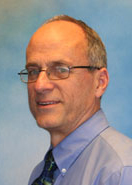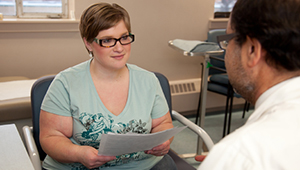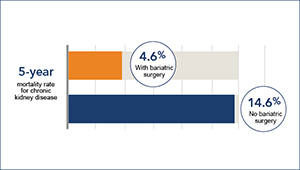Obesity
Research overview
“Obesity is the number-one health problem in the United States because it negatively affects our population’s health more than any other condition,” said Kaiser Permanente Washington Health Research Institute Senior Investigator David Arterburn, MD, MPH. Kaiser Permanente Washington researchers are doing practical research to learn how doctors, patients, families, employers, and policymakers can best work together to prevent and treat obesity.
“We’re focusing on three ways to halt the obesity epidemic,” said Senior Investigator Dori Rosenberg, PhD, MPH. “We’re helping to change obesity-promoting environments, bringing evidence-based prevention and treatment programs into health care systems, and helping people develop lifelong healthy diet and activity habits.”
Kaiser Permanente Washington obesity research areas include:
- reducing sedentary behavior and promoting physical activity and healthy diet in various age groups, populations with chronic conditions, and families;
- shared decision making to help patients find the best way to a healthy weight;
- implementing health coaches in primary care to support behavior changes;
- social networks that support lifestyle change programs;
- relationships between medications and genetic factors in developing obesity;
- health system, community, and national policies that address obesity;
- relationships between obesity and depression, diabetes, and other conditions; and
- long-term benefits and risks of bariatric (weight loss) surgery.
“Obesity is caused by many factors, so at Kaiser Permanente Washington, we’re working on many levels,” said Paula Lozano, MD, MPH, a senior investigator and Kaiser Permanente Washington’s assistant medical director for preventive care. “We’re improving health care to help people who are obese now. But since obesity is a societal problem, we’re also studying how to change our homes and workplaces and neighborhoods to create more healthy environments.”
Recent publications on Obesity
Henderson K, Lewis, Sloan CE, Bessesen DH, Arterburn D Effectiveness and safety of drugs for obesity 2024 Mar 25;384:e072686. doi: 10.1136/bmj-2022-072686. Epub 2024-03-25. PubMed
Courcoulas AP, Patti ME, Hu B, Arterburn DE, Simonson DC, Gourash WF, Jakicic JM, Vernon AH, Beck GJ, Schauer PR, Kashyap SR, Aminian A, Cummings DE, Kirwan JP Long-Term Outcomes of Medical Management vs Bariatric Surgery in Type 2 Diabetes 2024 Feb 27;331(8):654-664. doi: 10.1001/jama.2024.0318. PubMed
Sneed NM, Heerman WJ, Shaw PA, Han K, Chen T, Bian A, Pugh S, Duda S, Lumley T, Shepherd BE Associations Between Gestational Weight Gain, Gestational Diabetes, and Childhood Obesity Incidence 2024 Feb;28(2):372-381. doi: 10.1007/s10995-023-03853-8. Epub 2023-11-15. PubMed
Courcoulas AP, Daigle CR, Arterburn DE Long term outcomes of metabolic/bariatric surgery in adults 2023 Dec 18;383:e071027. doi: 10.1136/bmj-2022-071027. Epub 2023-12-18. PubMed
Tong J, Duan R, Li R, Luo C, Moore JH, Zhu J, Foster GD, Volpp KG, Yancy WS, Shaw PA, Chen Y Quantifying and correcting bias due to outcome dependent self-reported weights in longitudinal study of weight loss interventions 2023 Nov 4;13(1):19078. doi: 10.1038/s41598-023-41853-4. Epub 2023-11-04. PubMed
Researchers in Obesity
 David E. Arterburn, MD, MPHSenior Investigator |
 Allen Cheadle, PhDSenior Investigator, KPWHRI; Senior Research Associate, CCHE |
 Andrea J. Cook, PhDSenior Biostatistics Investigator |
 Maricela Cruz, PhDAssociate Biostatistics Investigator |
 Nicole M. Gatto, PhD, MPHPrincipal Collaborative Scientist |
 Beverly B. Green, MD, MPHSenior Investigator |
 Mikael Anne Greenwood-Hickman, MPHSenior Collaborative Scientist |
 Paula Lozano, MD, MPHSenior Investigator; Director, ACT Center |
 Dori E. Rosenberg, PhD, MPHSenior Investigator |
 Gregory E. Simon, MD, MPHSenior Investigator |











